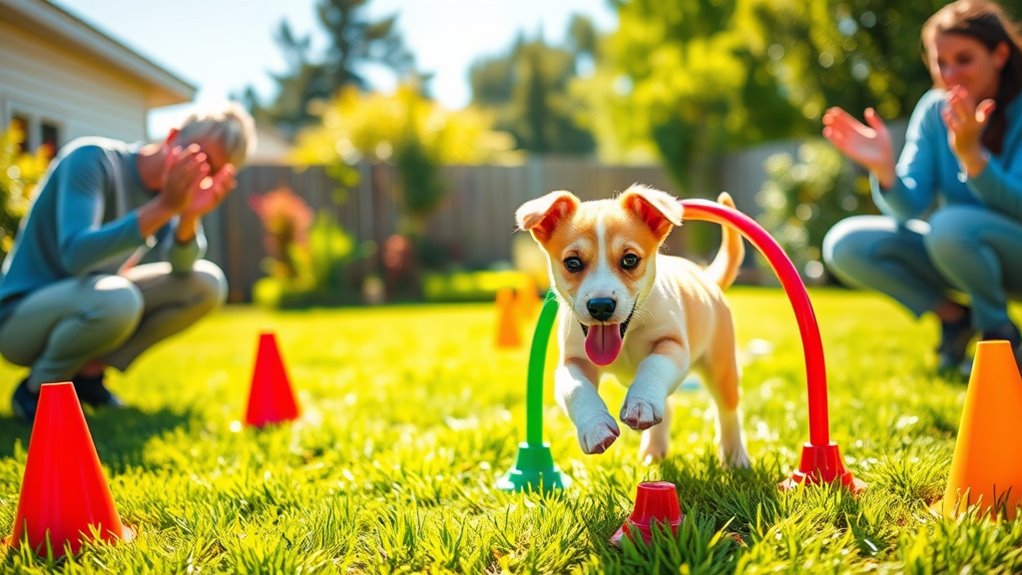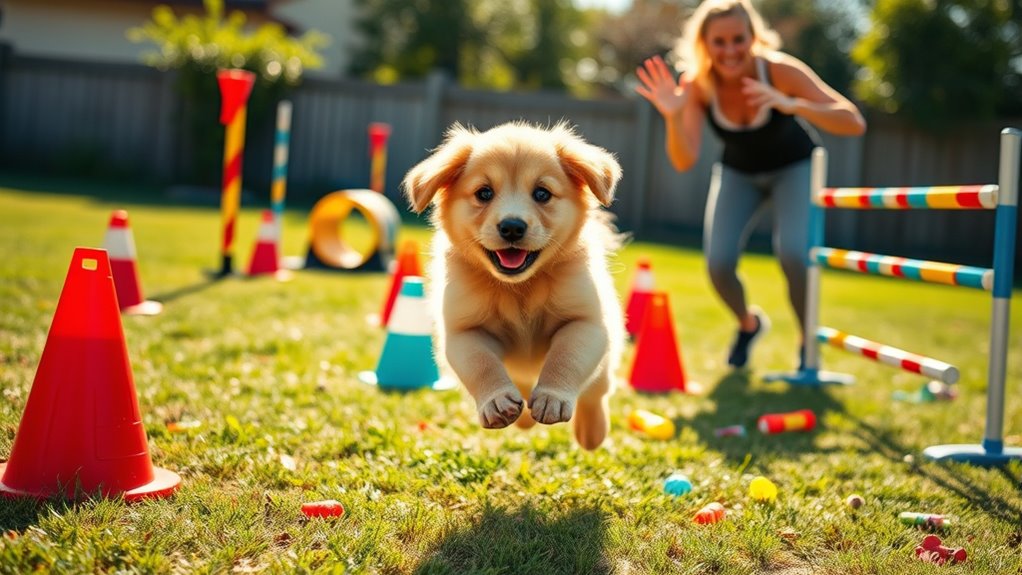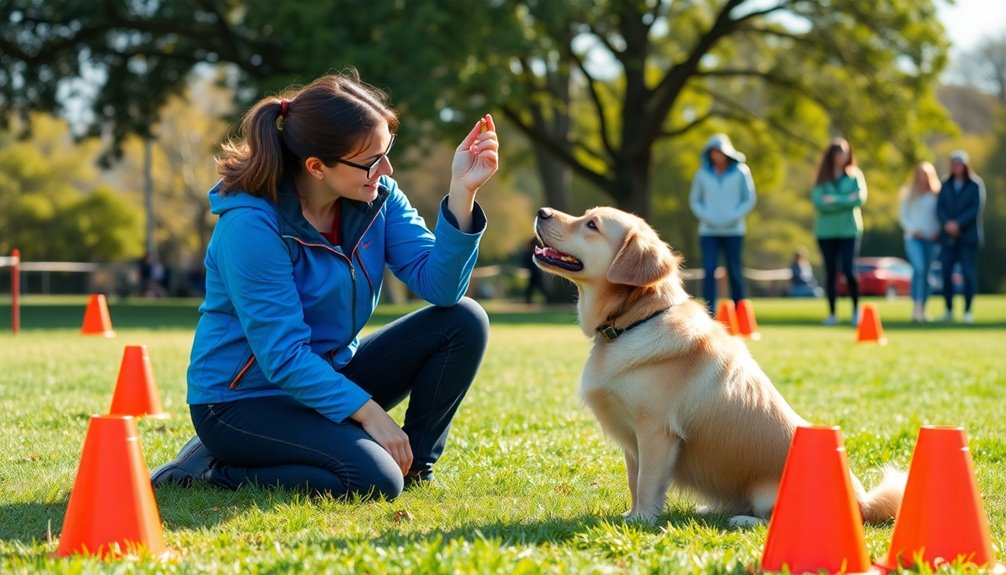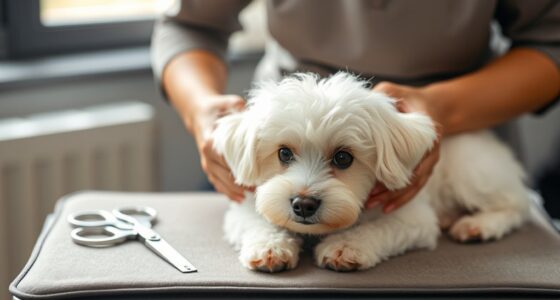To make training fun for your puppy, turn lessons into playful games like hide-and-seek or fetch that teach commands while keeping your pup engaged. Use treats, praise, and toys to reward good behavior instantly, making each session exciting. Keep activities short, lively, and varied to hold your puppy’s interest, and incorporate socialization naturally through game interactions. If you keep these tips in mind, you’ll discover ways to make puppy training both effective and enjoyable.
Key Takeaways
- Incorporate engaging games like fetch or hide-and-seek to teach commands and reinforce learning.
- Use toys and treats as rewards to motivate puppies during training sessions.
- Keep training sessions short, varied, and playful to maintain puppy enthusiasm.
- Combine socialization with fun activities involving new people or dogs to enhance positive experiences.
- End each session on a positive note to build excitement and eagerness for future training.

Are you ready to turn puppy training into an enjoyable experience? When you focus on making training fun, your puppy is more likely to stay engaged and enthusiastic to learn. One of the most significant aspects of early training is puppy socialization. By exposing your puppy to different people, animals, sounds, and environments in a positive way, you help them become confident and well-adjusted. Incorporate positive reinforcement techniques during socialization, rewarding your puppy with treats, praise, or play whenever they display calm, friendly behavior. This approach encourages your puppy to associate new experiences with positive outcomes, reducing fear or aggression later on.
Using game-based learning makes training sessions lively and effective. Instead of dull commands, turn learning into a game that captures your puppy’s attention. For example, you can play hide-and-seek with treats to teach scent tracking or practice fetch to reinforce commands like “come” and “drop it.” When your puppy successfully completes a task, immediately reward them with a treat or affection to reinforce the behavior. This positive reinforcement not only motivates your puppy but also strengthens your bond. Remember, the key is to keep the activities short, fun, and varied so your puppy remains interested and excited to participate.
Turn training into fun games like hide-and-seek and fetch to keep your puppy engaged and motivated.
Integrating play into training also helps your puppy learn faster. Puppies are naturally curious and energetic, so harness that energy in a productive way. Use toys and interactive games to teach basic commands like sit, stay, and heel. For instance, holding a treat near your puppy’s nose and moving it upward can prompt them to sit. When they do, praise and reward them instantly. This method keeps training sessions upbeat and prevents boredom. Plus, it sets a foundation for more advanced training later on.
Consistency is essential for game-based training to work well. Keep the sessions regular but brief—around five to ten minutes—and always end on a high note. If your puppy masters a trick, celebrate enthusiastically; if they struggle, gently guide them and try again later. Incorporate socialization opportunities into these games, like introducing your puppy to new people or friendly dogs, ensuring each encounter is positive and rewarding. Over time, your puppy will associate socialization and training with fun, making future lessons easier and more enjoyable for both of you.
Frequently Asked Questions
How Long Should Each Game Session Last for Puppies?
When considering how long each game session should last for puppies, it’s important to follow duration guidelines based on activity intensity. Generally, keep sessions between 5 to 10 minutes, as puppies have short attention spans. Monitor your pup’s energy levels and look for signs of fatigue or boredom. Short, engaging sessions prevent overwhelm and help your puppy stay excited, making training both fun and effective.
Are There Specific Games Recommended for Different Puppy Breeds?
Imagine a Labrador enjoying fetch, a breed-specific game that taps into their energy and love for retrieving. Different breeds thrive on age-appropriate activities and breed-specific games; for example, Border Collies excel at agility drills, while Dachshunds prefer scent work. Tailoring activities to your puppy’s breed guarantees they stay engaged and motivated, making training fun and effective. Always choose games suited to their size, energy level, and natural instincts.
How Do I Prevent My Puppy From Becoming Too Competitive During Training?
To prevent your puppy from becoming too competitive during training, focus on positive reinforcement rather than dominance. Keep training sessions calm and consistent, rewarding good behavior immediately. Avoid harsh corrections that might trigger competition or anxiety. Use a variety of games that emphasize cooperation, like fetch or tug-of-war, while praising your puppy for teamwork. This approach helps build trust, reduces competitiveness, and makes learning enjoyable for both of you.
Can Game-Based Learning Replace Traditional Puppy Training Methods?
Game-based learning can enhance training effectiveness by boosting your puppy’s engagement. While it’s a great supplement, it shouldn’t fully replace traditional methods, which provide essential structure and consistency. You can integrate games into your training routine to make sessions more enjoyable and interactive. This approach helps your puppy stay motivated, learn quickly, and build a strong bond, making overall training more successful and fun for both of you.
What Are Signs My Puppy Is Getting Bored or Frustrated With the Games?
You might notice boredom cues like yawning, ignoring commands, or losing interest during games. Frustration signals include barking, snapping, or trying to escape the activity. If your puppy shows these signs, it’s time to take a break or switch to a different game to keep training positive and engaging. Paying attention to these cues helps guarantee your puppy stays motivated and enjoys learning, making training sessions more effective.
Conclusion
Remember, a happy puppy is a well-trained puppy. By making training fun with game-based methods, you not only teach commands but also strengthen your bond. Keep sessions lively and positive, and your puppy will look forward to learning. As the saying goes, “All work and no play makes Jack a dull boy.” So, enjoy the process, stay patient, and watch your puppy thrive through playful training. It’s the secret to a joyful, obedient companion.










